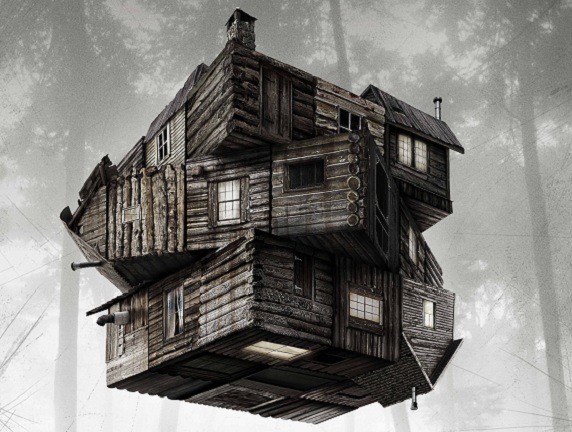Cabin in the Woods - review by R

I'm sure a lot of folks here have seen this by now, but I was a latecomer to this film as I have a tendency to avoid horror (the irony, since one of my classes in film school was all about horror - though that might be more cause than ironic, hmm). I finally was convinced by my older brother who hinted at the metatextual quality of the film, which swayed me (I love meta in my entertainment).
In short synopsis, we have in true horror film fashion a group of friends retreating to the woods somewhere for a vacation that turns horribly, horribly awry. Or does it?[This review is very spoiler-heavy, so if you haven't seen this movie, it will both spoil you and not make much sense otherwise.]
I have to admit, I spent a lot of the movie saying, "WTF?" to my tv screen, because we open with two desk jockey types on a golf cart, before we move into the expected exposition about beautiful, sexually active college kids looking to romp on a road trip that starts with a bizarre hillbilly warning (though Scream didn't cover that in their rules for surviving a horror film, Tobe Cooper and Texas Chainsaw certainly got that point across).
By the time I made some degree of sense of what the two disparate narratives were doing (the controllers and the victims), I was so caught up in what the story was doing I didn't really notice I was watching a scary movie (Note: I have nothing against horror or scary movies as a whole, but I get grossed out by the sight and sound of so much splatter). It changed narratives at a pace that kept me far more engaged than I expected.
The meta of the story was different than other meta I've seen and read about horror (I'll try and dig up the 20 page paper I did on the Final Destination series for ya'll sometime) in that it gave a reason, however flippant, for the tropes we've come to associate with this type of horror film. That it did so while subverting them completely was a great treat for me as a film viewer.
Trivia time: Fran Kranz's stoner character Marty didn't get into the lake because shirtless he actually is more physically defined than Chris Hemsworth or Jesse Williams. Yowza.
The way in which the movie spiraled to its ending, while gruesome, had a certain hilarity to it. For the modern audience who has seen everything, giving a literal bloodbath of a scene was such overkill as to be as comically subversive as the rest of the film. No one was the hero. The stoner wasn't the weak link in the group. Forces beyond the victim's knowledge were no more capable at surviving what they set in motion.
The narrative of the control booth had its own secondary meta to it, like that of being able to watch the process of making a scary movie. We got to see its directors, its producers, the invisible forces that dictate the final product that comes to the movie screen. That they suffered the same fate as those they were sacrificing is a bit of a wink by the writers to how much control (or how little) they have on the end result.
Ultimately, I really enjoyed this movie, both for its unique storytelling, and for the opportunity to read some subtext (intended and otherwise) into a genre that tends to be overlooked by critics and audiences who don't expect depth. This movie definitely had depth (and I don't just mean the sleeping giants).